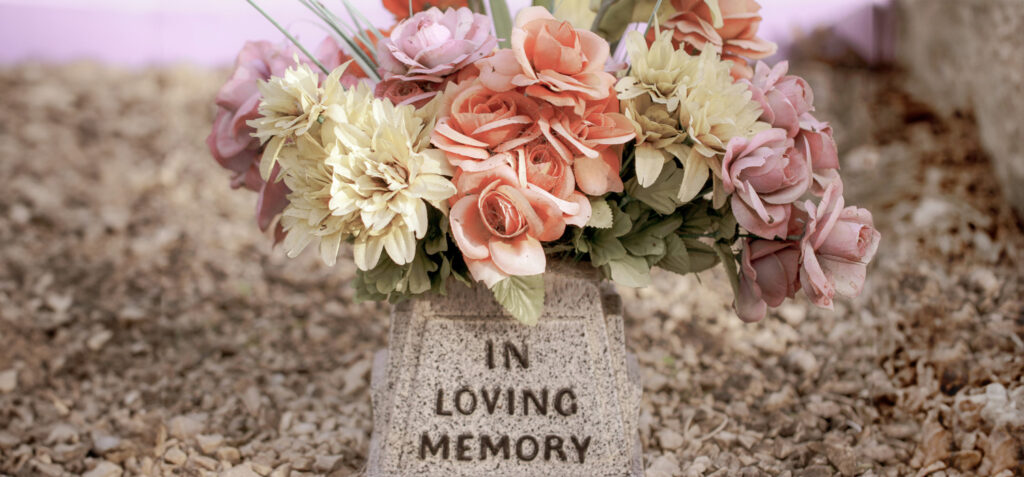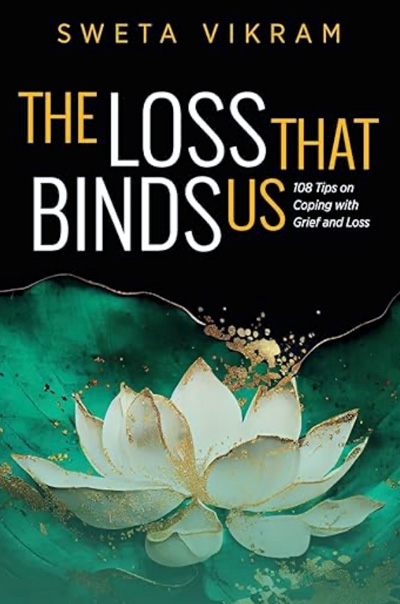
Estimated reading time: 9 minutes
An Ayurvedic doctor shares practices and insights that can improve not just the grieving process, but your health and enjoyment of life
—
In this Q&A, Bill Miles, Co-Founder and Creative Director of Best Self Magazine, puts forth questions for Dr. Sweta Vikram, inspired by her new book, The Loss that Binds Us: 108 Tips on Coping with Grief and Loss.
Q: Sweta, you’ve been a supporter and contributor to Best Self for several years now. Can you tell us how you became connected to Ayurvedic practices? How has Ayurveda shifted your life?
I grew up in an Indian, Hindu home where Ayurveda was a way of life and a few family members practiced yoga asanas daily. My mother was famous for her “healing abilities” — as in, she understood that plants are potent, so she would use food and spices to help in people’s healing journey. She wasn’t an Ayurvedic Doctor or practitioner, but she instinctively knew what foods worked best for a particular disease — be it someone recovering from heart attack to a kid recovering from chickenpox or a neighbor battling jaundice. The doctors were often impressed with her healing instincts that complemented their treatments. She would tell us to avoid mixing dairy with meat, chicken, and fish. As a teenager, I asked for scientific evidence for these suggestions, which my mom didn’t have. So, I let the information simmer.
After Mom passed away suddenly, I was filled with questions about Ayurveda and started exploring it more intentionally. When I found myself in critical life and health scenarios, I sought answers in classical Ayurvedic texts. It wasn’t just about health and wellbeing but also productivity. How to beat creative blocks! How to practice sustainable self-care. How to nourish mind-body wellbeing. How to implement daily rituals and much more. What spices were the best for each season? Or why shouldn’t we mix dairy with fruits?
What started as curiosity and desire to make day-to-day living better using holistic practices…changed over the years. I got more interested in the clinical practice of Ayurveda and disease management: Why do diseases happen and how do we get to the root cause? My mother’s unexpected passing was the big catalyst for this transformation. Then when I got off the cancer watchlist without being on any medication, even my surgeon and doctors agreed that my diet and lifestyle choices had played a big part in my recovery.
Q: In your new book, The Loss That Binds Us, you explore the complexities of grief and how Ayurveda provides a framework for navigating them. Can you elaborate on this and the 108 crucial “marma points” of your practice?
Grief is nuanced and complicated. It shows up when it chooses. I don’t think it ever truly goes away completely (I spoke with at least a dozen people who lost a parent decade or more ago, in the process of writing The Loss That Binds Us), but it slowly transforms and takes other shapes.
Ayurveda teaches us that most diseases start in the mind.
Unexpressed and unaddressed grief can become toxic and lead to anxiety, stress, burnout, emotional upheavals…to name a few. Ayurveda reiterates that the mind-body are connected, so grief might lead to imbalance in emotions, which will impact a person’s life choices around diet, lifestyle, relationships, and overall wellness. Dinacharya in Ayurveda, or daily routine, promotes self-care through different activities and can be extremely helpful.
Self-care needs to be sustainable and built into daily practices, especially when you are grieving. Because the mind will tell you stories and you will feel tempted to believe them. This could send one down a spiral. Ayurveda offers techniques and tips to stay grounded through the worst of life’s storms.
I cremated my father-in-law after completing the last rites for my own father and doing a ritual for Mom’s 9th death anniversary earlier that morning in a city 3 hours away. Later that night I caught a plane to JFK, from Mumbai, India, to attend school — I was studying to become an Ayurvedic doctor, and both my father and father-in-law were looking forward to this milestone achievement. Because of my dinacharya, I woke up diligently at a certain time, moved my body, connected with friends and family, meditated every day, paid attention to what I was feeding myself, supported my husband, managed to work and go to school, stayed in regular touch with the rest of our families who were grieving, and I didn’t brush aside my own grief.
Marma points are the vital points in our body, which contain prana or qi or life energy. Ayurveda’s Marma Chikitsa allows one to address emotional challenges at the root. Grief can deplete us on a cellular level and wreak havoc on our mental and emotional wellbeing. Part of my evolved dinacharya at the start of the grieving period also included massaging certain points on my face, head, and heart to release the stress, grief, and any emotional blockages. I also gave myself marma massage to relieve stiff muscles and boost circulation. I used dosha-specific oils to massage these points. Know that even a simple marma massage can help us get connected to our body and breath and as a result, will deepen our healing.
Q: For many, grief can feel very isolating…very personal and lonely. Yet it is actually an experience which connects all of humanity. How have you personally transformed this sense of isolation into a shared experience, and what has been the impact of that for you?
In our home, we had two deaths two days apart. My father-in-law died two days after my father passed away…none of these ends were expected. I didn’t have the privilege to just focus on me and my grief. My husband, brother, sister-in-law, and mom-in-law had all lost someone they loved. As a family-oriented person, I showed up for everyone. We also had nonstop condolence visitors for the first three months after we returned from India. I had to approach grief and grieving with a very different mindset.
I am quite the external processor, so I wrote about my journey. I intentionally carved out time to talk about my father and father-in-law daily. I shared stories of transformation and spirituality. Being a writer rooted in holistic wellness felt like the biggest gift during challenging times. It’s like I had an outlet and a channel for things to flow. My husband is an internal processor, so I held space for his need for pockets of solitude. He didn’t need to discuss his feelings or loss. He didn’t go in denial or fold up his grief. He didn’t leave his grief unaddressed either. What he needed was to sit with the discomfort and let it pass. To get clarity and figure out his next steps, he needed the quiet.
I understand that no one can replace my father or feel the excruciating loss that I must deal with. But I also know death doesn’t discriminate and touches each one of us at some point. If we are better prepared for the inevitable, we conserve our energy. In writing — social media posts or articles and essays, or even my book The Loss that Binds Us — with a focus on the many shades of grief, I connected with beautiful souls sailing in the same boat. I had mental health professionals tell me that my book gave them the permission to acknowledge their own grief.
Q: You sometimes refer to “unhealthy” patterns of grieving…can you explain what those are, and alternatives that are more effective?
Each individual and their needs are different. But fresh grief can create room for unhealthy diet and lifestyle habits, which can then become dependable and unhealthy patterns. For example, it you have an existing eating disorder, loss and grief can trigger it. It’s understandable if you choose to skip meals or eat at random while in the middle of the rites and rituals. But pay attention to your diet once you return to your “normal” life. I have seen clients fall prey to sugary treats or mindless indulgences or do no exercise or completely cut themselves off from everyone and then get frustrated with weight gain, emotional rawness, and health issues.
Sleep is another one. When we sleep is when the mind-body rests, flushes out the toxins, and boosts the immune system. Grief is exhausting. Your actions should boost your system, not deplete it. I believe in habits over motivation. Except for extreme exhaustion or an illness, I would recommend having a routine in place. It’s also a good distraction from your own grief.
I didn’t ask myself if I wanted to exercise or cook or see a cousin or attend classes or complete a deadline. A grieving heart would say NO to all of the above. But I showed up to people and responsibilities while being discerning of who/what nourished me.
Yes, the grief feels destabilizing, but you have to find the motivation to make mindful choices for your mental, physical, financial, and emotional wellbeing.
Q: Lastly, for readers who may be contending with loss in their lives right now and feel stuck in a whirlwind of emotions, what would you most like them to take away from this conversation to help them through?
No one is coming to save any of us so prioritize what you need.
I don’t mean to be morbid.I was raised to believe that when we take care of each other as human beings, society heals and progresses. But life and loss, along with becoming an orphan in my 40s, has taught me that nothing in this world is permanent. Yes, I experienced much kindness from strangers and loved ones. After my dad’s passing, friends and family surrounded us with food, hugs, cards, flowers, visits, messages, love, and much more for over three months. But I also felt abandoned and “orphaned” by many older extended family members.
I learned that relationships, emotions, success, failure, sadness, good times, bad times…they are all transient and fleeting. People are so caught up in what serves them best and their own struggles that no one has the capacity to care after a certain point. I don’t blame anyone for it. We have all been wronged by people we didn’t expect, by those close to us…and we’ve likely all wronged some people we care about, even if unwittingly. I have learned that unless you take care of yourself and lean into self-reliance, it’s impossible to heal and move on.
Grief has taught me to find joy, cherish good memories, build strong social connections, not hold grudges, make time for my healing, be fully present, surround myself with nourishing company, prioritize my own needs, lean onto people I trust, hold space for the dichotomy of grief, and practice gratitude for the big and small things we take for granted.
You may also enjoy reading, 7 Ways to Release Grief from Your Body, by Joni Sensel.
